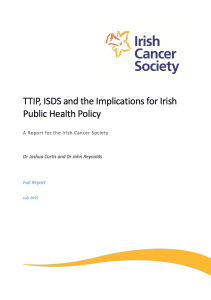New report of the Irish Cancer Society: TTIP, ISDS and the Implications for Irish Public Health Policy
A new report of the Irish Cancer Society concludes that the economic benefits from the Transatlantic Trade and Investment Partnership (TTIP) are too small or speculative to justify the associated social and public health risks. The report also recommends negotiating TTIP without any form of ISDS.
The Irish Cancer Society has commissioned the report: “TTIP, ISDS and the implications for Irish public health policy” because the debate on TTIP in Ireland has so far centred on the potential economic benefit. The report has been written by Dr Joshua Curtis of the London School of Economics and Political Science (LSE) and Dr John Reynolds of Maynooth University – both experts in human rights and trade policy. It concludes that the predicted economic gains are too small to justify the social risks and particularly, the risks to our public health which would result from ISDS in TTIP.
“Ireland receives seven times the EU average Foreign Direct Investment from the United States and this shows quite clearly that the country doesn’t need this type of trade agreement,” said Kathleen O’Meara, Head of Advocacy & Communications, at the Irish Cancer Society.
“Ireland has never had a claim against it under investor protection, so if this is provided for in TTIP, there will be a massive exposure to Irish laws and in particular in the area of public health.”
The United Nations Special Rapporteur on the Right to Health, Anand Grover, has recently argued that investment treaties “may affect State’s power to introduce health laws in the public interest”. Small countries are particularly vulnerable. Slovakia has faced three claims from foreign investors impacted by the government’s decision to amend its policy on health insurance and Uruguay has had to rely on philanthropic support from Michael Bloomberg and Bill Gates to defend itself from the tobacco industry.
“There is a lack of evidence supporting the link between trade agreements like TTIP and economic growth,” said Dr John Reynolds of Maynooth University.
“Far from raising standards on health and social protection, these agreements actually reduce standards to the lowest common denominator and restrict the right of the Government to regulate in the public interest.”
For further reading, please download the Executive Summary and the Full Report:

Executive Summary:
TTIP, ISDS, Public Health Policy – Irish Cancer Society
Full Report:
Other reports on the subject:
LSE study: TTIP, International Trade Law, Health Systems and Public Health – Full report